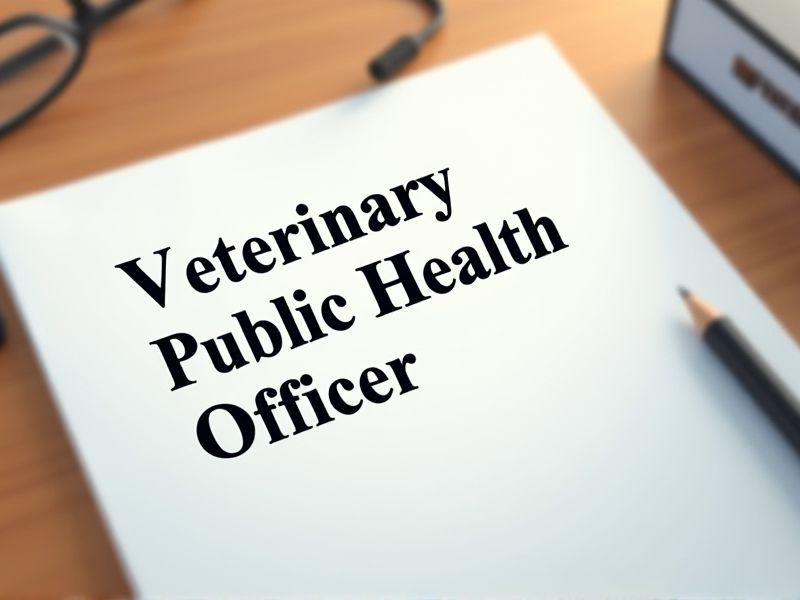
Veterinary Public Health Officers play a crucial role in safeguarding both animal and human health, making specialized certifications essential. These certifications ensure they possess the necessary skills to address zoonotic diseases and manage public health emergencies. Regulatory frameworks often require updated knowledge, further necessitating formal proof of specialized training. Explore some key certifications that can enhance and verify your expertise as a Veterinary Public Health Officer.
Certified Veterinary Public Health Officer (CVPHO)
The role of a Certified Veterinary Public Health Officer (CVPHO) enhances the expertise in controlling zoonotic diseases, which is crucial for public health. With certification, officers gain specialized knowledge in epidemiology, improving disease surveillance and prevention strategies. This role strengthens inter-sectoral collaboration, bridging the gap between veterinary and human health sectors. Furthermore, certified officers bring reliability and trust, increasing community compliance with health regulations.
Certified Veterinary Epidemiologist (CVE)
Certified Veterinary Epidemiologists (CVEs) possess specialized skills to analyze disease patterns among animal populations, which is crucial for informed decision-making in veterinary public health. Their expertise in identifying and controlling zoonotic diseases directly contributes to reducing public health risks. CVEs employ data-driven methodologies to understand disease transmission dynamics, enhancing strategies for outbreak prevention and control. Their role in risk assessment supports the development of policies that safeguard both animal and human health.
Certified Food Safety Professional (CFSP)
Certified Food Safety Professionals possess specialized knowledge in food safety protocols, which directly impacts the effectiveness of a Veterinary Public Health Officer tasked with controlling zoonotic diseases. The certification emphasizes preventive measures, reducing foodborne illness risks that Veterinary Public Health Officers monitor in livestock and food products. CFSP credentials ensure that Veterinary officers are updated on the latest regulations and best practices, enhancing public trust and compliance with safety standards. Food safety expertise assists Veterinary Officers in developing policies that integrate animal health and human food safety concerns seamlessly.
HACCP Certification
Veterinary Public Health Officers require HACCP Certification to systematically manage and prevent food safety hazards, ensuring animal-derived food products are safe for consumption. Implementing HACCP principles helps in identifying critical control points, reducing the risk of foodborne illnesses linked to animal products. Certification also aligns with international standards, enhancing trade opportunities and regulatory compliance. Achieving HACCP Certification fosters consumer confidence in public health systems and the safety of the food supply chain.
Certified Public Health (CPH)
Certified Public Health (CPH) credentials enhance a Veterinary Public Health Officer's credibility by validating their expertise in public health principles. This certification broadens the officer's understanding of disease prevention and control, which is crucial when managing zoonotic diseases. CPH provides a structured framework for officers to effectively collaborate with other health sectors in safeguarding public health. The knowledge gained through CPH can lead to more informed decision-making, promoting animal and human health.
Biosecurity Management Certification
Biosecurity Management Certification equips Veterinary Public Health Officers with the necessary skills to prevent the outbreak of infectious diseases in animal populations. Implementing rigorous biosecurity measures reduces the risk of zoonotic diseases, which can be transmitted from animals to humans, thus safeguarding public health. This certification ensures that officers are up-to-date with the latest protocols and technologies for disease surveillance and control. Effective biosecurity management contributes to maintaining the integrity of the food supply chain, promoting consumer confidence in agricultural products.
Zoonotic Disease Control Certification
Zoonotic diseases, which are transmitted between animals and humans, pose significant public health risks. A Zoonotic Disease Control Certification equips Veterinary Public Health Officers with expertise in preventing and controlling such outbreaks. This certification ensures they stay updated with current best practices and emerging threats in zoonotic disease management. Effective control by trained officers can mitigate the spread of zoonoses, protecting both animal and human populations.
Risk Assessment and Management Certification
Risk Assessment and Management Certification equips Veterinary Public Health Officers with the skills to identify and mitigate potential health threats, enhancing public safety. This certification ensures they are proficient in analyzing risks associated with zoonotic diseases, improving their response capabilities. With increased globalization, the risk landscape in veterinary public health is evolving, making specialized training crucial. Proper risk management minimizes economic losses by controlling disease outbreaks efficiently.
Environmental Health and Safety (EHS) Certification
EHS Certification enhances a Veterinary Public Health Officer's ability to manage biosecurity risks effectively, safeguarding both animal and human health. Understanding environmental regulations through EHS training ensures compliance and prevents legal ramifications associated with public health violations. The certification equips officers with skills to identify and mitigate workplace hazards, reducing incidents of injury or disease transmission. Comprehensive EHS knowledge supports the implementation of sustainable practices, promoting longevity in public health efforts and ecological balance.
Certification in One Health (COH)
Certification in One Health (COH) equips Veterinary Public Health Officers with a comprehensive understanding of integrated health approaches, leading to improved disease prevention strategies across human, animal, and environmental sectors. It fosters interdisciplinary collaboration skills, crucial for addressing complex health challenges such as zoonotic diseases that transcend traditional boundaries. A COH certification enhances the capability to develop and implement effective public health policies that consider ecological and socio-economic factors. This qualification also ensures that officers remain updated on current global health trends, vital for effective crisis management and response planning.
Summary
You, as a Veterinary Public Health Officer, can leverage certifications to enhance your expertise in animal disease control and public health safety, making you a more valuable asset to your organization. Obtaining these credentials often improves your credibility and increases trust among colleagues and the public. With specialized skills, career advancement opportunities and leadership roles may become more accessible. Your contributions to community health initiatives likely yield more effective results when backed by certified training and knowledge.
